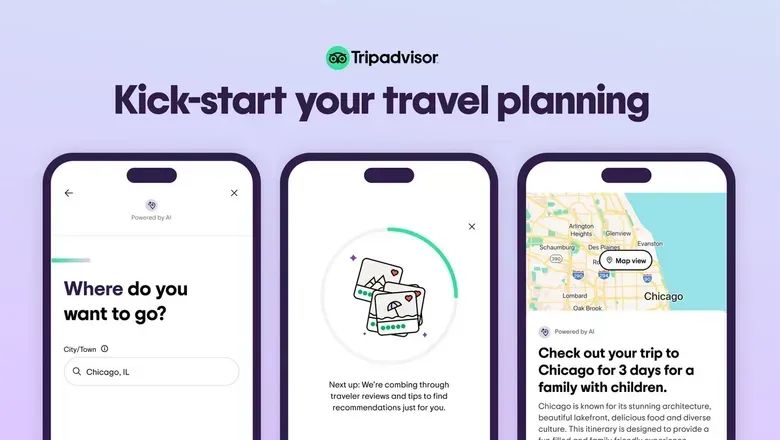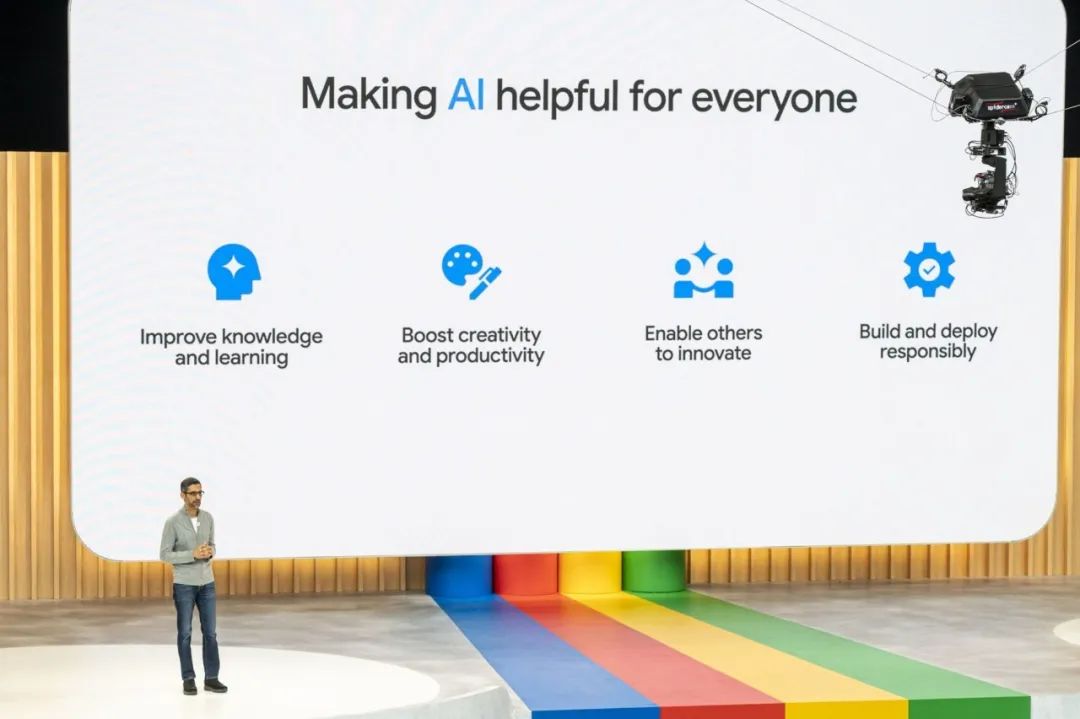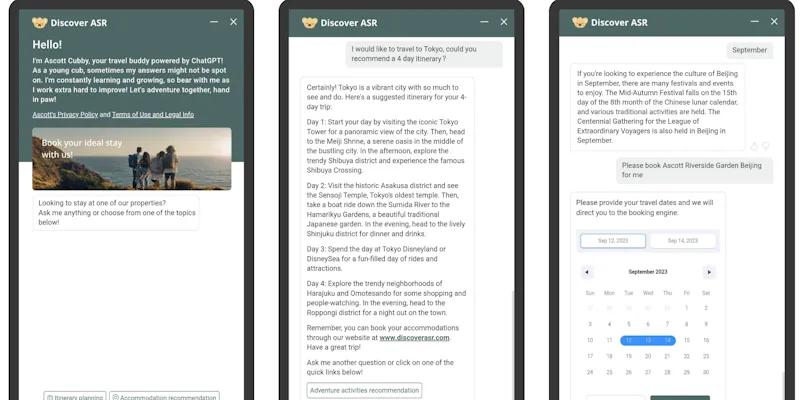AI Transforming Tourism: First Wave of Travel Companies Profiting from AI Praise Its Impact
-
This week marks another global spotlight on AI.
Yesterday, OpenAI, parent company of the large language model ChatGPT, announced a preliminary agreement: Sam Altman returns as CEO with a new board formation.

Days ago, OpenAI faced a brewing crisis when the majority of its employees threatened to resign unless the board members who fired CEO Sam Altman stepped down, creating widespread controversy.
The global fascination with the 'OpenAI leadership shakeup' underscores a world that has been deeply influenced by ChatGPT over the past year, including the tourism sector.
Since OpenAI launched ChatGPT, the tourism industry has been scrambling to research and implement large language model-based chatbots.
Nearly every major player in the global tourism sector is rapidly rolling out plugins to integrate generative AI into their apps and websites, triggering an 'arms race.'
In China, Ctrip has released the first vertical large model for the tourism industry, 'Ctrip Ask,' advancing the development and application of AI, data analytics, and cloud technologies to drive business growth and operational efficiency.
Internationally, leading online travel companies are all talking about 'AI.' Expedia, Tripadvisor, and Airbnb have started acquiring small AI firms or incorporating AI into their apps and websites.
Recently, Airbnb unexpectedly announced the acquisition of GamePlanner.AI. On the same day, Nasdaq-listed travel technology company Mondee also acquired an AI firm called Purplegrids.
Airbnb co-founder and CEO Chesky described GamePlanner.AI as "very special" after the acquisition.
He candidly stated, "Artificial intelligence will change our world more rapidly than any technology in our lifetime." Chesky believes that "by working together, Airbnb can develop some of the best interfaces and practical applications for AI."
As for how Airbnb will utilize GamePlanner.AI's technology? An industry insider pointed out that, as Chesky has ambitiously mentioned before, AI may become the foundation of Airbnb's travel agency in the future.
Other online travel platforms are also accelerating their adoption of AI technologies. Earlier this month, Tripadvisor's latest financial report revealed updates to its AI travel planning feature launched in July, along with specific performance data for AI-assisted travel planning.
During the earnings call, Tripadvisor CEO Goldberg noted that users of the generative AI travel planning tool showed significantly higher conversion rates and revenue compared to regular users, with differences reaching up to three times.

Expedia has also connected a basic OpenAI-powered chat window to its own database. The focus here may not be on artificial intelligence itself, but rather on the incremental changes an API interface can bring to the industry.
Among the thousands of companies using large language models, the only moat for online travel enterprises lies in models further trained on specialized data.
When we were discussing at the beginning of the year how AI would transform the travel industry, its impact has clearly unfolded faster than we imagined.
As travel companies surge in AI investments, tourists who have used AI features are raving about them.
The latest research released by Oliver Wyman indicates that travelers find generative artificial intelligence extremely useful in their trip planning process.
This management consulting firm surveyed over 1,000 travelers in the U.S. and Canada in August this year, discovering that consumer acceptance of generative AI is surprisingly high.
As Oliver Wyman director Hornik put it, the survey results are encouraging and "exciting."
Hornik said: "Considering these AI tools were only launched earlier this year, it's surprising how many people are already using generative AI for travel."

The report examined chatbots including Google's Bard, Booking.com's AI Trip Planner, Expedia's ChatGPT integration, and Priceline's Penny, finding that over one-third of leisure travelers have recently used generative AI-powered trip planning tools.
An Oliver Wyman executive noted that for AI technology that's only been on the market for about six months, this represents remarkably high user adoption rates.
He noted that the number of travelers making bookings based on AI-generated recommendations is also high, "not only is the adoption rate high, but the satisfaction rate is also high."
In fact, the current application of AI in the tourism industry leans more towards pre-sales trip planning, where it has already brought significant savings in labor costs to the sector.
Tripadvisor CEO Goldberg pointed out that using AI for tourist trip planning can drive deeper engagement with travelers.
He analyzed two examples: one where using generative AI to create fresh content guides can save over 15% in operational costs, and another where tourists use Tripadvisor's products to add desired hotels, restaurants, or day trips to their planned travels.
Another example is a test conducted by Tripadvisor across tens of thousands of hotels, using Gen AI to summarize user reviews and provide high-quality evaluation reports for travelers considering accommodation options. For instance, if getting a good night's sleep is the most important factor for booking a hotel, the AI can generate summary reports on noise levels at specific hotels, as well as quickly compile individual pieces of information important to travelers, such as ambiance and service quality. This eliminates the need for users to sift through thousands of guest reviews.
Beyond online travel, AI is indeed a significant application scenario for the traditional hotel industry. At Wyndham Hotels & Resorts, generative AI has already begun to make an impact.
Scott Strickland, Chief Information Officer of Wyndham Hotels & Resorts, stated, "We are already using AI today to improve efficiency," he said. "For example, we integrate AI into our customer service systems to address common guest issues, allowing team members more time to focus on other guest needs that require personalized service."
While some pioneering travel companies have started using AI technology to outperform their competitors, the impact and significance of AI in the tourism industry hold even broader visionary potential.
Looking ahead, Booking Group CEO Glenn Fogel stated they are focused on further integrating artificial intelligence into travel products, which has already shown benefits in certain aspects.

Dynamic pricing algorithms for hotels and flights, virtual travel assistants, and post-travel customer service robots represent AI applications in the tourism industry that remain relatively isolated.
Currently, AI doesn't appear to be a technology that can provide unlimited insights and automation for the travel industry solely through "big data." The reality is it still has limitations, primarily because travel companies have only scratched the surface of its potential.
Fogel likened AI technology to slicing bread, stating, "For all new technologies, the hype is always exaggerated. Everyone thinks AI will be the greatest thing since sliced bread, but then it needs to be more enduring than toast."
Fogel said, "This is what we're seeing now. AI technology is truly exciting, and I absolutely believe it will bring industry transformation, but it will take a long time."
As the first online travel company in China to release a large model, James Liang, founder of Ctrip, also pointed out that the tourism industry is a heavy industry. While hotel front desk check-ins might be automated, tasks like cleaning, organizing, and construction are still difficult for AI to replace.
"AIGC can assist OTAs (Online Travel Agencies) in the pre-sale, post-sale, and during-trip stages. In the pre-sale stage, the travel industry has vast amounts of unstructured and structured data, and AIGC can help digest the unstructured data. In the post-sale stage, natural language and robots can improve service efficiency and experience. During the trip, AI assistants can provide more real-time guidance and feedback," Liang said.
It's worth mentioning that the transformative power of artificial intelligence depends on the information we provide. Without data, you can't do anything with it. In the future, the scale of data will determine who can utilize this technology and to what extent.
As AI begins to drive new forms of hotel, flight management, and personalization, those travel companies that can leverage data and guest details to solve data acquisition challenges will dominate.
For example, the potential of artificial intelligence in the hotel and short-term rental sectors goes far beyond this.
In addition to the publicly available information on OTAs and hotel websites, although each hotel has hundreds of variable pieces of information, it's difficult to display them all to C-end consumers one by one. AI will complement the uniqueness of each hotel, allowing users to utilize deeper hotel data to extract properties that meet guests' personalized search criteria.
Certainly, the more challenging aspect is unleashing the second potential of artificial intelligence in the tourism industry—true personalization.
Taking the hotel industry as an example, while it has improved occupancy rates compared to other sectors, it has also limited the amount of guest information hotels can collect. Imagine if the AI facilitating guest communication could learn more about its customers—customer service would improve significantly, and hotels could increase their direct sales proportion.

For hotel professionals, there would no longer be a need to memorize guest preferences like teacup placement or slipper positions. AI could make customized services accessible beyond luxury hotels, bringing them to mid-range and even budget hotels at a lower cost.
Generative artificial intelligence is a small part of deep learning, which in turn is only a subfield of machine learning. AI is changing the tourism industry, but this is just the beginning.
